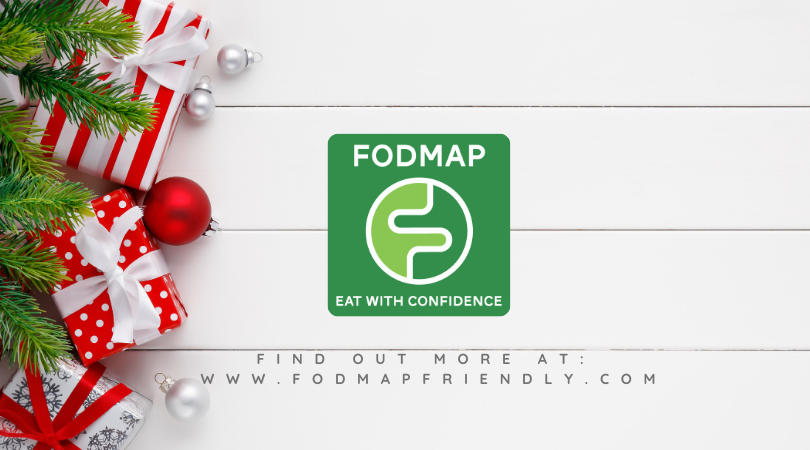Top tips for the festive season
Posted on December 15, 2021
This time of year can bring about a wide range of uncomfortable gut symptoms for everyone, but even more so for people struggling with IBS. The festive season is a fun time for many filled with lots of delicious food and drinks but often, the downside of the large portions, stress and disruption of your normal routine can cause gut issues for many. In this article we will discuss some of our top tips for enjoying this festive season on a low FODMAP diet.
Hydration
During the holidays, consumption of drinks other than water is often increased such as carbonated drinks and alcohol. But both alcohol and carbonated drinks may trigger or exacerbate symptoms. Alcohol can irritate the gut which may lead to a flare-up of IBS symptoms and carbonated drinks may lead to dehydration. During this time it’s good to enjoy the occasional drink but also, focus on continuing to drink water regularly, to help with adequate hydration which helps your body digest food properly and even more so in the warmer weather to avoid dehydration.
Tip: Aim for at least 2L of water per day to help with digestion and hydration.
Exercise
Regular movement is good for both our physical and mental health, low intensity movement such as walking, jogging, and swimming which is ideal in the hot weather, can help with relaxing and also help with digestion and keeping your bowel movements regular.
Being out of our regular routines often means that regular exercise is decreased such as playing sports, daily walks or even walking around at work. That’s why it’s important to prioritise exercise during this time of year and it can also be helpful and fun to include other people, for example, kicking around a ball or Frisbee with friends and family.
Tip: Find ways to incorporate regular exercise into your day. This may include going for nice afternoon stroll or jumping into the pool on a hot day.
Portion sizes
During this time of year we all tend to eat a little bit more than usual and of course we tend to enjoy all of the delicious food but this can often cause uncomfortable gut problems. For people with IBS, regular sized meals can cause issues like bloating, cramps, diarrhoea or constipation so a larger sized meal is likely to cause the same symptoms but much worse.
To avoid this, stick to smaller portion sizes for all of your food as this is less likely to cause you symptoms. Additionally, ensuring that you’re chewing all of your food properly and taking your time when eating. Chewing your food well makes it easier for your gut to digest as you’re giving it smaller chunks of food to breakdown and taking your time when eating can prevent overrating which can cause bloating and pain/cramps. It can help to put down your cutlery in-between bites to make sure that you’re taking your time and chewing things well.
Tip: Take your time when eating and eat things in moderation by having smaller portion sizes as this is less likely to cause symptoms.
Tip: Use the FODMAP Friendly App to help with low FODMAP serve sizes (Google Play for Android or Apple for iPhones).
Planning ahead
If your symptoms tend to occur when you’re out and about you may want to have snacks prepared in advance to eliminate the temptation of eating something that may be high in FODMAPs. Also, having low FODMAP snacks in-between meals means that you won’t get overly hungry before your next meal which can cause us to have larger portions. Sharing these snacks with friends and family can also be a great idea, check out some festive season snacks which include snacks that can be shared with others.
Additionally, you can also let whoever is preparing the food, as well as other friends and family know in advance about your low FODMAP diet and/or offer to bring a dish! Make a dish that you know you can enjoy and likely not to trigger any symptoms but can also be shared with others, this way you are guaranteed to have a low FODMAP option available. Check out some low FODMAP Christmas lunch recipes for some ideas.
Tip: Take low FODMAP snacks with you on the go and let friends and family know about your diet in advance.
Relaxing
This time of year can be very busy and stressful so, it’s important that you’re taking the time to rest and look after yourself. Stress can exacerbate IBS symptoms; they can become more frequent and more aggressive so, making sure that you’re resting by getting good and enough sleep is very important as well as participating in activities which help you to relax which may include meditation, exercise or any other hobbies such as reading or playing sports.
Tip: Being stressed may exacerbate your IBS symptoms so making sure you’re taking time to rest and relax may alleviate stress and thus, may alleviate symptoms.
Minimising symptoms
When you’re not preparing the food yourself it may be inevitable to prevent IBS symptoms from occurring but some ways of minimising the symptoms include resting and using a heat pack. It may help to lay down with a hot water bottle. Additionally, peppermint oil or capsules such as taking Mintec Peppermint IBS Relief may help with relieving symptoms.
Tip: Use heat packs and mint capsules to alleviate symptoms when they occur.
In summary
Prioritising hydration, resting, exercising, and focusing on minimising symptoms, by planning ahead and being mindful of low FODMAP serve sizes and meal portion sizes are our tips for enjoying the festive season to the fullest while on a low FODMAP diet. In addition to this, remember that many Dietitians still work throughout the holidays so work with your FODMAP-trained Dietitian and Doctor to navigate your condition.
Written by: Ijmeet Maan (Accredited Practising Dietitian)
Reviewed by: Kiarra Martindale (Accredited Practising Dietitian)















